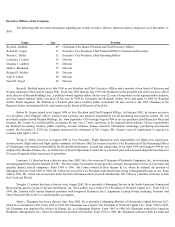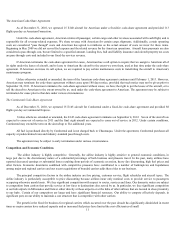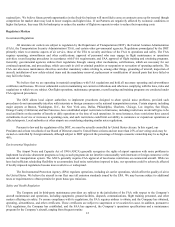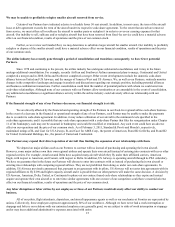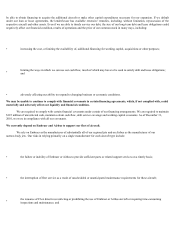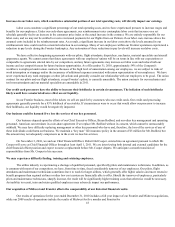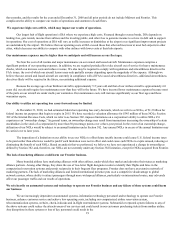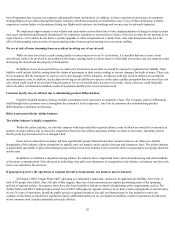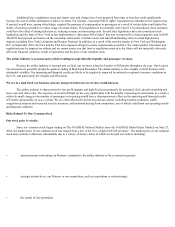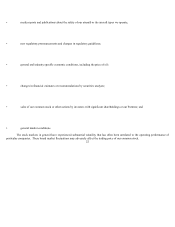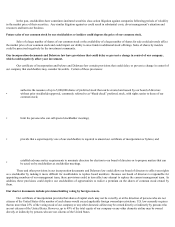Frontier Airlines 2010 Annual Report Download - page 23
Download and view the complete annual report
Please find page 23 of the 2010 Frontier Airlines annual report below. You can navigate through the pages in the report by either clicking on the pages listed below, or by using the keyword search tool below to find specific information within the annual report.representation of our employees. If we are unable to reach agreement with any of our unionized work groups on the amended terms of their
collective bargaining agreements, we may be subject to work interruptions and/or stoppages. Any sustained work stoppages could adversely
affect our ability to fulfill our obligations under our code-share agreements and could have a material adverse effect on our financial
condition, results of operations and the price of our common stock.
Under the terms of our jet code-share agreement with US Airways, if we are unable to provide scheduled flights as a result of a
strike by our employees, it is only required to pay us for certain fixed costs for specified periods. Under the terms of the code-share
agreements with the remainder of our Partners, none of them are required to pay us any amounts during the period our employees are on
strike and we are unable to provide scheduled flights. A sustained strike by our employees would require us to bear costs otherwise paid by
our Partners.
In addition, a labor disruption other than a union authorized strike may materially impact our results of operations and could cause
us to be in material breach of our code-share agreements, all of which require us to meet specified flight completion levels during specified
periods. Our Partners have the right to terminate their code-share agreements if we fail to meet these completion levels.
Our Partners may be restricted in increasing the level of business that they conduct with us, thereby limiting our growth.
In general, the pilots' unions of certain major airlines have negotiated “scope clauses” in their collective bargaining agreements,
known as CBAs, that restrict the number and/or size of aircraft that can be operated by the regional code-share partners of such major
airlines.
The US Airways' pilot CBA provides that the total number of aircraft in US Airways operations not flown by US Airways pilots
(which includes flying by partners under code-share arrangements) may not exceed 465. Within the overall 465 aircraft limit, there is no
quantity limitation on the number of small regional jets (defined as aircraft configured with 78 or fewer seats) that may be flown by regional
code-share partners. Also within the 465 total aircraft limit, US Airways can outsource up to 93 aircraft with more than 78, but fewer than 91
seats, including E175 and C900 aircraft. US Airways does not restrict the aircraft that its partners may fly for other carriers.
The American Airlines' pilot CBA prohibits regional code-share partners from operating aircraft with more than 50 seats, whether
flown on behalf of American or for other carriers.
Delta's pilot CBA prohibits its regional code-share partners from operating aircraft with more than 76 seats, whether flown on behalf
of Delta or for other carriers. Further, code-share partners may operate no more than 255 aircraft configured with 51 to 76 seats (including
120 aircraft configured with 71 to 76 seats, subject to increase with increases in Delta's fleet size).
United's pilot CBA prohibits code-share partners from operating aircraft on behalf of United configured with more than 70 seats or
weighing more than 80,000 pounds. However, this limitation does not apply to aircraft flown by the code-share partner on behalf of carriers
other than United.
Continental's pilot CBA prohibits code-share partners from operating aircraft on behalf of Continental configured with more than 50
seats. However, similar to United's restriction, this limitation does not apply to aircraft flown by the code-share partner on behalf of carriers
other than Continental.
We have significant debt and off-balance sheet obligations and any inability to pay would adversely impact our operations.
The airline business is very capital intensive and, as a result, many airline companies are highly leveraged. During the years ended
December 31, 2010 and 2009, our mandatory debt service payments for aircraft totaled $319.4 million and $278.3 million, respectively, and
our mandatory lease payments totaled $233.8 million and $194.3 million, respectively. We have significant lease obligations with respect to
our aircraft, which aggregated approximately $1.5 billion and $1.6 billion at December 31, 2010 and 2009, respectively.
We have a significant amount of variable interest rate debt. Approximately $482.7 million and $506.8 million of our debt as of
December 31, 2010 and 2009, respectively, is subject to variable market interest rates. If rates increase significantly, our results of operations
and cash flows could be adversely impacted.
There can be no assurance that our operations will generate sufficient cash flow to make such payments or that we will
16


